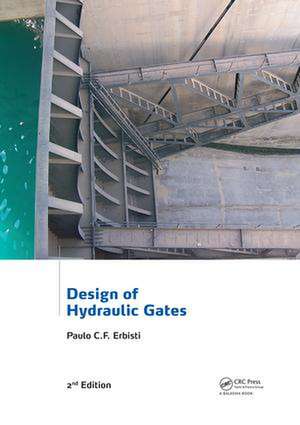Design of Hydraulic Gates
Autor Paulo C.F. Erbistien Limba Engleză Paperback – 31 mar 2017
| Toate formatele și edițiile | Preț | Express |
|---|---|---|
| Paperback (1) | 713.53 lei 6-8 săpt. | |
| CRC Press – 31 mar 2017 | 713.53 lei 6-8 săpt. | |
| Hardback (1) | 1413.12 lei 6-8 săpt. | |
| CRC Press – 29 mai 2014 | 1413.12 lei 6-8 săpt. |
Preț: 713.53 lei
Preț vechi: 870.16 lei
-18% Nou
Puncte Express: 1070
Preț estimativ în valută:
136.53€ • 148.77$ • 115.05£
136.53€ • 148.77$ • 115.05£
Carte tipărită la comandă
Livrare economică 23 aprilie-07 mai
Preluare comenzi: 021 569.72.76
Specificații
ISBN-13: 9781138073739
ISBN-10: 1138073733
Pagini: 442
Dimensiuni: 174 x 246 x 23 mm
Greutate: 0.82 kg
Ediția:2nd edition
Editura: CRC Press
Colecția CRC Press
Locul publicării:Boca Raton, United States
ISBN-10: 1138073733
Pagini: 442
Dimensiuni: 174 x 246 x 23 mm
Greutate: 0.82 kg
Ediția:2nd edition
Editura: CRC Press
Colecția CRC Press
Locul publicării:Boca Raton, United States
Cuprins
1. Introduction; 2. Types of gates; 3. Basis for selection of gate type; 4. Hydrostatics; 5. Structural design; 6. Embedded parts, guides and supports; 7. Estimating gate weights; 8. Hydrodynamic forces; 9. Gate operating forces; 10. Aeration; 11. Gate hoists; 12. Materials; 13. Gate seals; 14. Manufacture, transportation and erection; 15. Trends and innovation in gate design; 16. Intake gates; 17. Intake trashracks
Notă biografică
Brazilian engineer Paulo Erbisti graduated in mechanical engineering and has amassed considerable experience working on numerous hydromechanical projects, contributing greatly to hydropower/dam engineering over the last few decades in South America, Africa and Asia. He has worked on many important projects including Itaipu, Belo Monte, Tucurui, Gotvand, Tarbela, Capanda, Guri and Tocoma. Erbisti is a visiting professor on the topic of hydraulic gate design for the post-graduate course of hydraulic engineering at the University of Paraná, Brazil. He is a member of the consulting board of the International Journal on Hydropower and Dams, UK. In 2011, he was elected by International Water Power & Dam Construction magazine as one of twenty people believed to have made the biggest difference to the sector over the last decade.
Recenzii
Praise for the first edition:
Nobody is better qualified than Professor Paulo Erbisti to have written this book “Design of Hydraulic Gates”, because he has acquired a very broad personal experience during his career devoted to hydroelectric projects, not only with a scientific spirit, but also a practical approach. He knows very well all the phases of implementation of hydromechanical equipment, from feasibility studies through to erection and commissioning, as well as rehabilitation.
This book is extremely welcome as an efficient synthesis of a broad subject, and engineers from the various disciplines, not only mechanical and electrical but also civil engineers, will recognize its value. The author has covered the subject of gates very comprehensively in his book, from history to new developments. He discusses not only the principle of gates and their associated equipment, the choice of type and calculation methods, but also he (as an excellent practical engineer, who knows that ‘the devil hides in the details’) describes their construction details. Each chapter is supported by a complete list of international references.
The book will be very useful for experienced engineers (as well as students) for the conception, construction and operation of gates.The interest of this book is evident as a reference, and Professor Erbisti should be gratefully acknowledged for his important contribution to this technology.
Raymond Lafitte, Professor at EPFL (Federal Institute of Technology, Lausanne), President of the International Hydropower Association
As one leafs through the book, one is pleasantly surprised by the many clear illustrations and photos (ca. 300), tables (ca. 70) and calculations (ca. 20). […] On the one hand, the book – as a textbook – offers students a very clear introduction to the field and on the other hand, represents a handbook with lots of useful advice for engineers in the field of steel hydraulic engineering. Some 90 bibliographic references lead the reader to further background information, also in the realm of more theoretically oriented steel hydraulic engineering. Erbisti’s book "Design of Hydraulic Gates" is all in all a very useful and recommended book.
Prof. Dr.-Ing. Gerhard Schmaußer, Aalen, in Stahlbau 73 (2004), 644-646
Nobody is better qualified than Professor Paulo Erbisti to have written this book “Design of Hydraulic Gates”, because he has acquired a very broad personal experience during his career devoted to hydroelectric projects, not only with a scientific spirit, but also a practical approach. He knows very well all the phases of implementation of hydromechanical equipment, from feasibility studies through to erection and commissioning, as well as rehabilitation.
This book is extremely welcome as an efficient synthesis of a broad subject, and engineers from the various disciplines, not only mechanical and electrical but also civil engineers, will recognize its value. The author has covered the subject of gates very comprehensively in his book, from history to new developments. He discusses not only the principle of gates and their associated equipment, the choice of type and calculation methods, but also he (as an excellent practical engineer, who knows that ‘the devil hides in the details’) describes their construction details. Each chapter is supported by a complete list of international references.
The book will be very useful for experienced engineers (as well as students) for the conception, construction and operation of gates.The interest of this book is evident as a reference, and Professor Erbisti should be gratefully acknowledged for his important contribution to this technology.
Raymond Lafitte, Professor at EPFL (Federal Institute of Technology, Lausanne), President of the International Hydropower Association
As one leafs through the book, one is pleasantly surprised by the many clear illustrations and photos (ca. 300), tables (ca. 70) and calculations (ca. 20). […] On the one hand, the book – as a textbook – offers students a very clear introduction to the field and on the other hand, represents a handbook with lots of useful advice for engineers in the field of steel hydraulic engineering. Some 90 bibliographic references lead the reader to further background information, also in the realm of more theoretically oriented steel hydraulic engineering. Erbisti’s book "Design of Hydraulic Gates" is all in all a very useful and recommended book.
Prof. Dr.-Ing. Gerhard Schmaußer, Aalen, in Stahlbau 73 (2004), 644-646
Descriere
This book covers the principal aspects of the design, manufacture, installation and operation of hydraulic gates. It analyzes in depth the selection of the gate type and the limits of their use, estimates their weight, operative forces, hoisting systems, design of structure and support elements, seals and hydrostatic and hydrodynamic forces. It discusses inflatable gates and fuse gates, adds new chapters on intake gates and intake trashracks, and also includes worked examples, drawings and photographs to illustrate the concepts and methods involved.




















